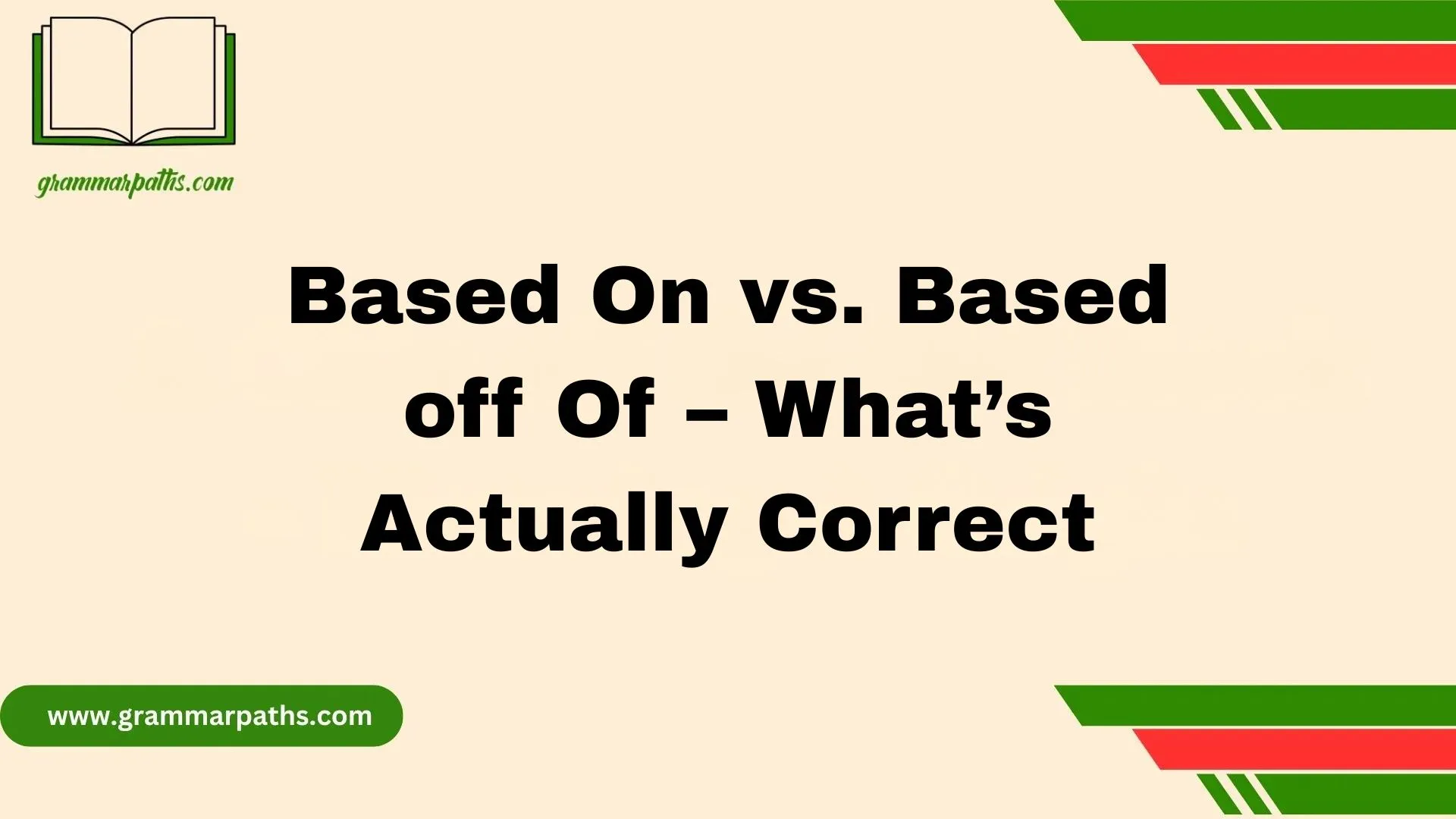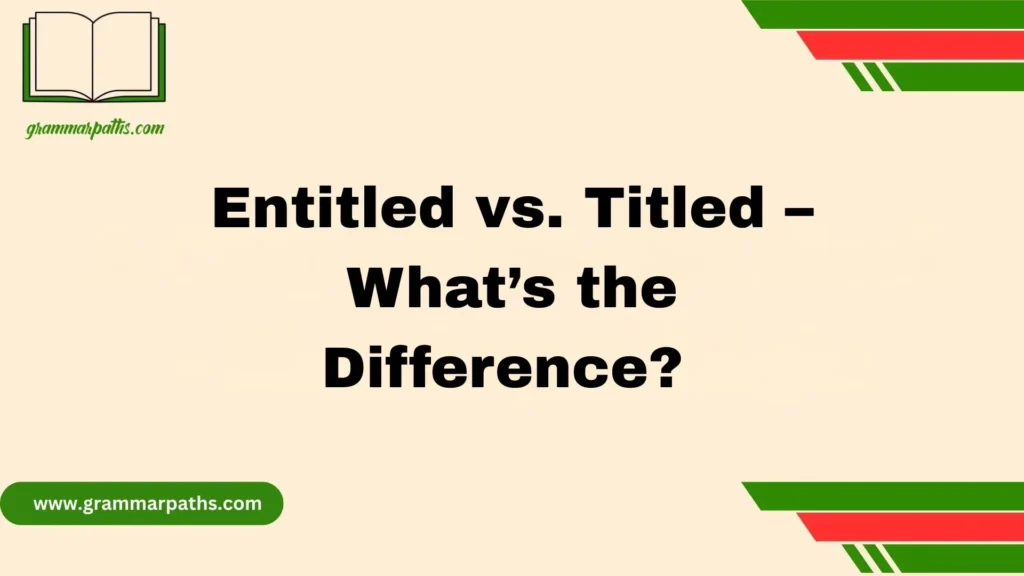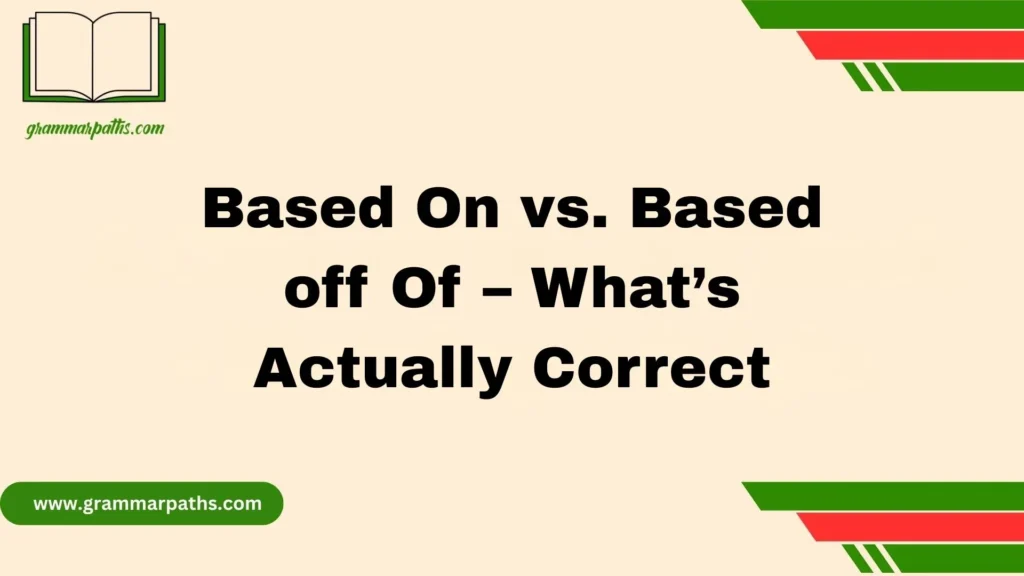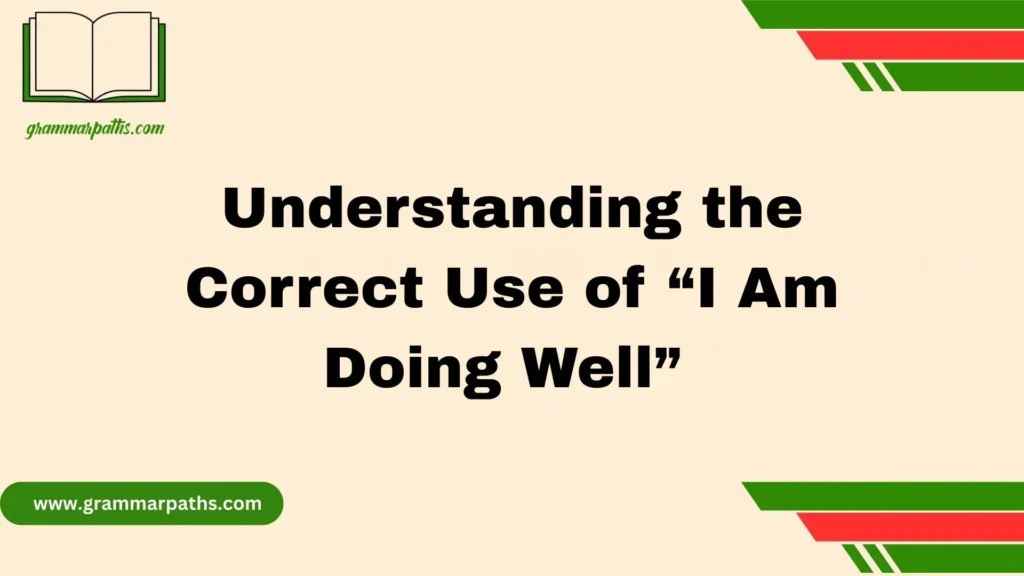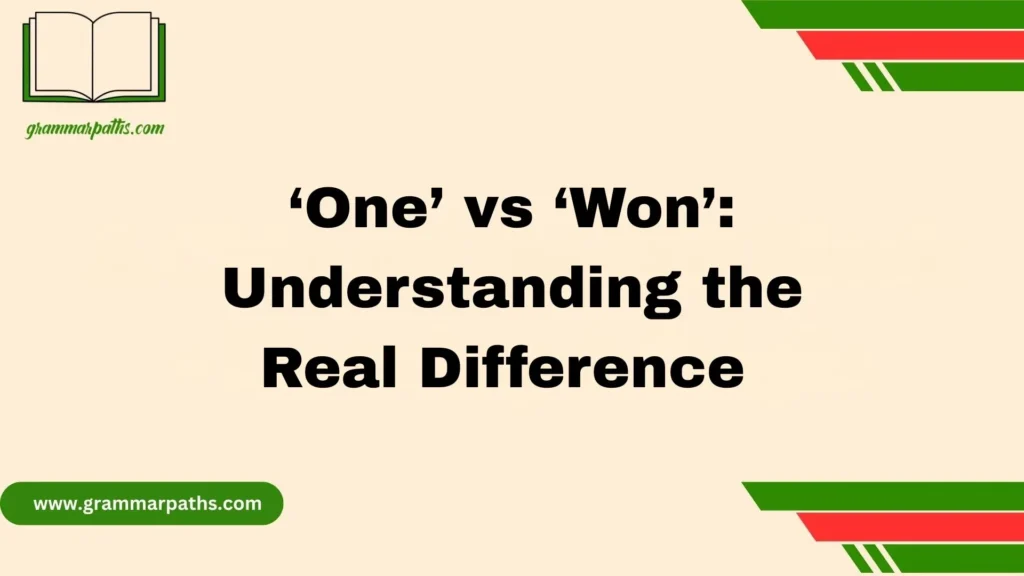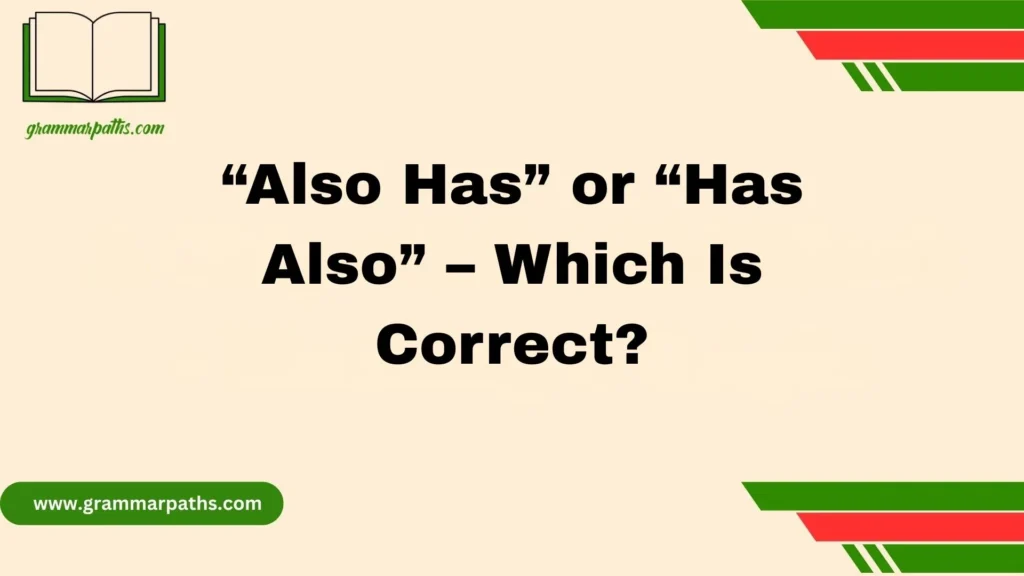When it comes to English grammar and writing, few phrases confuse people as much as “based on” and “based off of.” Both are widely used, but their meanings, origins, and correct usage differ. Understanding the distinction between based on vs. based off of is essential for clear, professional communication.
The phrase “based on” is the traditional and grammatically accepted form. It means that something is built, inspired, or derived from a particular source or idea. For example, “The movie is based on a true story.” On the other hand, “based off of” is a more informal expression that has grown popular in spoken English, especially in American usage. It implies that something starts from or branches away from another concept.
While “based on” fits better in formal writing, academic papers, or professional contexts, “based off of” is common in casual speech and creative settings. Recognizing when to use each phrase helps improve your language precision and fluency. In this guide, we’ll explore the difference between based on and based off of, their grammatical structure, examples, and which one you should use depending on the situation.
What “Based On” Really Means
When you say something is “based on” something else, you’re saying it’s built upon or founded upon an existing idea, fact, or source. Grammatically, “based” acts as a past participle (from base), and “on” is a preposition linking it to its foundation.
For example:
- The movie is based on a true story.
- Her opinion is based on experience, not rumor.
The phrase “based on” dates back to the early 19th century, with roots in formal and academic writing. It reflects a logical structure — something solid resting on a foundation, just as a building stands on its base.
Historically, this version appeared in legal documents, architecture treatises, and later in academic essays. Even today, style authorities like The Chicago Manual of Style and Merriam-Webster consider “based on” the standard and grammatically correct form.
Why Writers and Professionals Prefer “Based On”
- It’s concise and formal.
- It’s used consistently across British and American English.
- It aligns with other “on” expressions like built on, focused on, and dependent on.
In formal communication—business writing, research papers, reports—“based on” signals professionalism and precision.
How “Based off Of” Entered the Scene
Language evolves through speech before writing catches up. “Based off of” emerged in the late 20th century, especially in American English, as an informal variation of “based on.”
People started saying things like:
- The show is based off of real events.
- My theory is based off of what I’ve seen at work.
In casual conversation, “off of” often feels more natural because we use it frequently in daily speech—think get off of the couch or jump off of the wall. Over time, this pattern influenced phrases like “based off of.”
Influences Behind the Phrase’s Popularity
- The rise of conversational media (TV, podcasts, YouTube).
- American speech patterns that favor “off of” constructions.
- The blending of spoken and written English through social media posts.
Case Study: The Pop Culture Effect
In the 1990s, Hollywood scripts and entertainment journalism began favoring “based off of.” Movie posters, interviews, and taglines like “Based off of a best-selling novel” made the phrase familiar. Once audiences heard it repeatedly, it felt normal — even if grammarians frowned upon it.
That’s how informal usage slowly gains acceptance — through exposure, not correctness.
Comparing the Two: Grammar, Logic, and Clarity
To truly see how they differ, let’s compare “based on” and “based off of” side by side.
| Aspect | Based On | Based off Of |
| Grammar Type | Traditional construction (verb + preposition) | Double preposition (verb + off + of) |
| Tone | Formal, academic, professional | Conversational, informal |
| Usage Region | Both UK & US English | Mainly American English |
| Common Contexts | Research papers, business writing | Speech, casual writing, media |
| Formality Level | High | Medium to low |
| Clarity | Direct and precise | Can feel wordy or redundant |
Grammatically, “based on” makes more sense. You’re describing a relationship of dependency — one thing rests on another.
By contrast, “based off of” uses two prepositions (“off” and “of”), which can sound redundant. Linguists call this pleonasm — using more words than necessary. It’s not “wrong,” but it’s less efficient.
Why Some Say “Based off Of” Sounds Wrong
From a logical viewpoint, “off” suggests separation or movement away from something. Saying “based off of” could sound contradictory — how can something be built away from its foundation?
For example:
- The novel is based off of real events (implies detachment).
- The novel is based on real events (implies connection).
That’s why “based on” still wins for clarity, accuracy, and professional tone.
The Role of Prepositions: “On” vs. “Off Of”
Prepositions may look small, but they hold meaning power. The difference between “on” and “off of” changes the direction of the relationship.
- “On” implies support, contact, or dependence.
- The design is based on simplicity.
- Her theory rests on sound logic.
- “Off of” implies movement or separation.
- He jumped off of the chair.
- Take the lid off of the jar.
You can see why grammarians prefer “on” in “based on.” The logic aligns better: ideas rest on other ideas — not off of them.
Common Verbs Paired with Each
| Verb | Correct Preposition | Example |
| Depend | On | Success depends on effort. |
| Focus | On | Let’s focus on the task. |
| Build | On | We built on last year’s progress. |
| Jump | Off (of) | He jumped off the table. |
| Take | Off (of) | Take your shoes off of the bed. |
So, while “off of” works perfectly with physical actions, “on” fits logical or conceptual relationships—like ideas, data, or reasoning.
Regional and Cultural Differences
Language is alive, and regions shape its personality.
In British English, “based on” dominates both speech and writing. “Based off of” is almost unheard of and often viewed as an Americanism.
In American English, both appear—but context matters.
- In formal American writing (reports, academic essays, journalism), “based on” remains the rule.
- In spoken or online English, “based off of” shows up more frequently.
Corpus Insights
The Corpus of Contemporary American English (COCA) shows that “based on” appears roughly 40 times more frequently than “based off of” in published material.
That means, despite its rise in conversation, “based on” still dominates in professional writing.
Why Regional Preferences Matter
When writing for international audiences, using “based on” ensures clarity and universal understanding. “Based off of” might sound too informal or localized for global readers.
What Style Guides and Linguists Say
Major language authorities are clear on this one.
- The Chicago Manual of Style: Recommends “based on” in all professional and academic contexts.
- Merriam-Webster Dictionary: Lists “based off of” as an informal variant, not incorrect but nonstandard.
- Oxford English Dictionary: Notes that “based on” has long been the preferred form in written English.
- Grammarly and APA Style both flag “based off of” as casual usage.
Linguists’ Perspective
Modern linguists tend to take a descriptive rather than prescriptive view. That means they observe how people actually use language instead of enforcing rigid rules.
From this view, “based off of” isn’t “wrong.” It’s simply an evolving phrase shaped by spoken American English. However, even linguists agree: context dictates correctness.
Use “based on” when precision, professionalism, and clarity matter most.
When to Use “Based On” vs. “Based off Of”
Here’s a quick decision guide to help you choose confidently:
| Situation | Preferred Phrase | Example |
| Academic writing | Based on | This theory is based on Newton’s laws. |
| Professional reports | Based on | The proposal is based on client feedback. |
| Journalism | Based on | The story is based on verified information. |
| Everyday speech | Based off of | My guess is based off of what I saw earlier. |
| Social media posts | Based off of (casual) | This meme is based off of that famous scene. |
Simple Rule of Thumb
- Writing something formal or public? Use “based on.”
- Talking to a friend or posting online? “Based off of” is fine.
As language expert Bryan Garner notes, “Standard English favors economy. ‘Based on’ accomplishes in two words what ‘based off of’ does in three.”
Common Mistakes and Misconceptions
Let’s clear up a few misunderstandings around these phrases.
Mistake 1: Thinking “Based off of” is Always Wrong
It’s not. It’s informal, not incorrect. Grammar evolves, and usage often decides what’s “right.”
Mistake 2: Mixing “Based Upon,” “Derived From,” or “Built On”
Each has subtle differences:
- Based on – uses something as a foundation.
- Derived from – takes inspiration or origin from something.
- Built on – expands upon an existing idea.
- Based upon – a slightly more formal variant of “based on.”
Mistake 3: Using “Off Of” in Formal Writing
In academic or business contexts, phrases like “off of” appear clunky. Dropping “of” (“off”) is cleaner and more professional:
- Take your shoes off the table.
- Take your shoes off of the table.
Language Evolution: Why Rules Keep Changing
English isn’t static—it bends with culture, media, and communication trends.
Consider these once-debated pairs:
- Different from vs. Different than
- Toward vs. Towards
- Who vs. Whom
What we see now is that conversational English often wins. The same may happen over time with “based off of.”
Why This Change Happens
- Media exposure: TV and social media amplify informal speech.
- Ease of expression: “Off of” feels intuitive to many speakers.
- Generational influence: Younger generations adopt patterns they hear most often online.
But remember: acceptance takes time. While “based off of” might become fully standard someday, today’s best practice is to stick with “based on” for clarity and correctness.
Quick Recap – The Core Takeaway
Here’s a quick summary table you can refer back to:
| Category | Based On | Based off Of |
| Formality | Formal | Informal |
| Grammatical Accuracy | Preferred | Acceptable in speech |
| Tone | Professional | Conversational |
| Common Use | Writing | Speaking |
| Global Recognition | Widely accepted | Mostly American English |
| Recommended Use | Always safe choice | Use casually only |
Golden Rule: Use “based on” in writing and “based off of” in speech.
Conclusion
In summary, the choice between “based on” and “based off of” comes down to context and tone. The phrase “based on” is grammatically correct, formal, and accepted in professional and academic writing. It shows that something is founded or derived from a source. Meanwhile, “based off of” is more informal and conversational, often used in American English when speaking casually or creatively.
If you want your writing to sound polished, clear, and professional, stick with “based on.” However, if you’re writing dialogue, casual content, or something meant to sound natural and modern, “based off of” may fit better. Ultimately, both expressions share similar meanings, but their tone and acceptability vary depending on the audience and setting.
Mastering the difference between based on vs. based off of enhances not only your grammar but also your confidence in communication.
FAQs
1. Is “based off of” grammatically correct?
Technically, it’s not considered grammatically correct in formal writing, but it’s widely accepted in casual American English.
2. When should I use “based on”?
Use “based on” in essays, reports, and professional documents to maintain a formal tone.
3. Can I use “based off” without “of”?
No, the correct informal phrase is “based off of”, though it’s still less formal than “based on.”
4. Is “based off of” American or British English?
“Based off of” is mainly used in American English, while British English strongly prefers “based on.”
5. Which is more popular: “based on” or “based off of”?
“Based on” remains the most common and accepted form worldwide, especially in written communication.

Grace Marie is the dedicated writer behind GrammarPaths.com, where she shares her passion for English grammar, idioms, and writing mastery. With a strong background in language studies and years of experience helping learners improve their communication skills, Grace creates clear, practical, and engaging content that makes English easy to understand.
